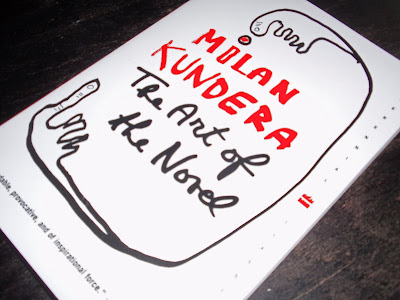"Obscenity: the root that attaches us most deeply to our homeland."
This is Milan Kundera going one step further from Czeslaw Milosz who famously wrote that language is the only homeland. I love Kundera's ability to get into the core of an issue with a pithy definition. I bumped into this one while browsing his "Art of the Novel" and I could not stop laughing.
What he describes is a familiar sentiment to all of us who have been uprooted out of our native linguistic context and into a second or a third language. Swearing in a foreign language? No problem! It carries almost no weight. You say the words just like any other words because you are detached. You don't feel them as bad, inappropriate, or harsh.
In my own language, on the other hand, I use them with utmost care. Don't ask me to teach you to swear in Serbian because I won't--first, because Serbian curses are really harsh and, second, because there is a proper context for swearing and that, for me, always involves being home (as in, home in Serbia). Out of that context, it doesn't feel right.
It is funny, when I am irritated or angry, I use a Bulgarian expression "po dyavolite" which means "to hell." Now, to Ruslan this is extremely rude and he reprimands me every time. My other Bulgarian friends say this is an old-fashioned curse which almost doesn't feel like one, it is kind of charmingly outdated. That's how I feel about it, too.
The Serbian equivalent "dodjavola" (it has identical meaning) is so light, I don't think anyone would consider it an obscenity. In fact, I bet people would just burst out laughing at it. But then it is true that we are a nation which curses a lot, and a general threshold of tolerance to using "bad language" is much higher than in other places I lived.
In Serbia, swearing is weaved seamlessly into conversations, whether it's a friendly banter or a serious discussion (as for arguments, that goes without saying). It completely cuts across class, geographical origin or education--you can't pigeonhole people based on swearing because everyone does swear a lot, from manual workers to university professors. It's one true democratic pursuit.
That's one thing that has been a cultural shock for Ruslan and I don't think he managed to get used to it even after all these years. Our cultures are otherwise incredibly similar, our languages very much alike, most of our idiomatic expressions are the same and, generally, we have very similar "mentality," except for this one difference that we curse a lot and, somehow, they don't. Why is that?
What he describes is a familiar sentiment to all of us who have been uprooted out of our native linguistic context and into a second or a third language. Swearing in a foreign language? No problem! It carries almost no weight. You say the words just like any other words because you are detached. You don't feel them as bad, inappropriate, or harsh.
In my own language, on the other hand, I use them with utmost care. Don't ask me to teach you to swear in Serbian because I won't--first, because Serbian curses are really harsh and, second, because there is a proper context for swearing and that, for me, always involves being home (as in, home in Serbia). Out of that context, it doesn't feel right.
It is funny, when I am irritated or angry, I use a Bulgarian expression "po dyavolite" which means "to hell." Now, to Ruslan this is extremely rude and he reprimands me every time. My other Bulgarian friends say this is an old-fashioned curse which almost doesn't feel like one, it is kind of charmingly outdated. That's how I feel about it, too.
The Serbian equivalent "dodjavola" (it has identical meaning) is so light, I don't think anyone would consider it an obscenity. In fact, I bet people would just burst out laughing at it. But then it is true that we are a nation which curses a lot, and a general threshold of tolerance to using "bad language" is much higher than in other places I lived.
In Serbia, swearing is weaved seamlessly into conversations, whether it's a friendly banter or a serious discussion (as for arguments, that goes without saying). It completely cuts across class, geographical origin or education--you can't pigeonhole people based on swearing because everyone does swear a lot, from manual workers to university professors. It's one true democratic pursuit.
That's one thing that has been a cultural shock for Ruslan and I don't think he managed to get used to it even after all these years. Our cultures are otherwise incredibly similar, our languages very much alike, most of our idiomatic expressions are the same and, generally, we have very similar "mentality," except for this one difference that we curse a lot and, somehow, they don't. Why is that?
















